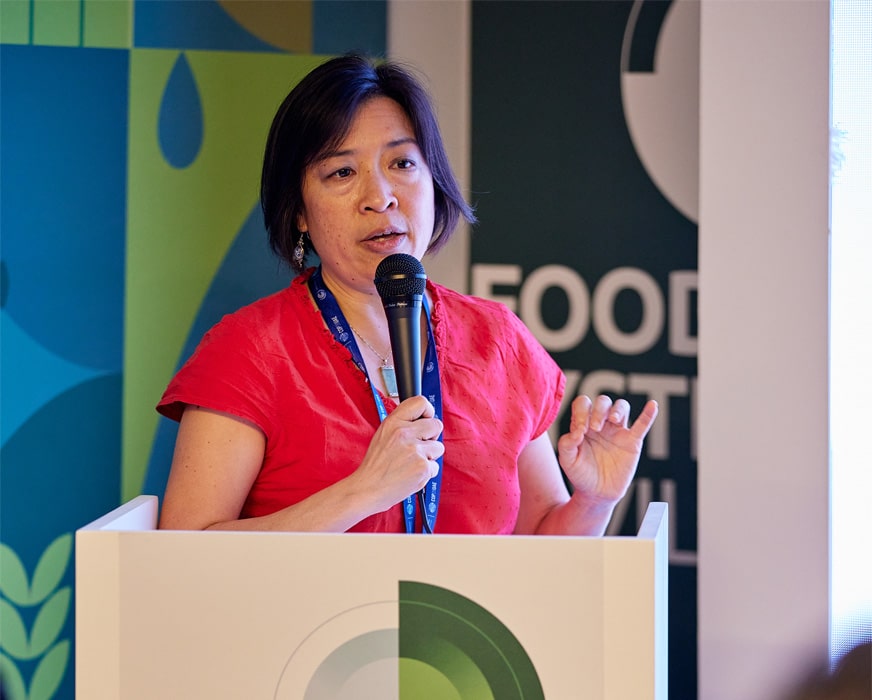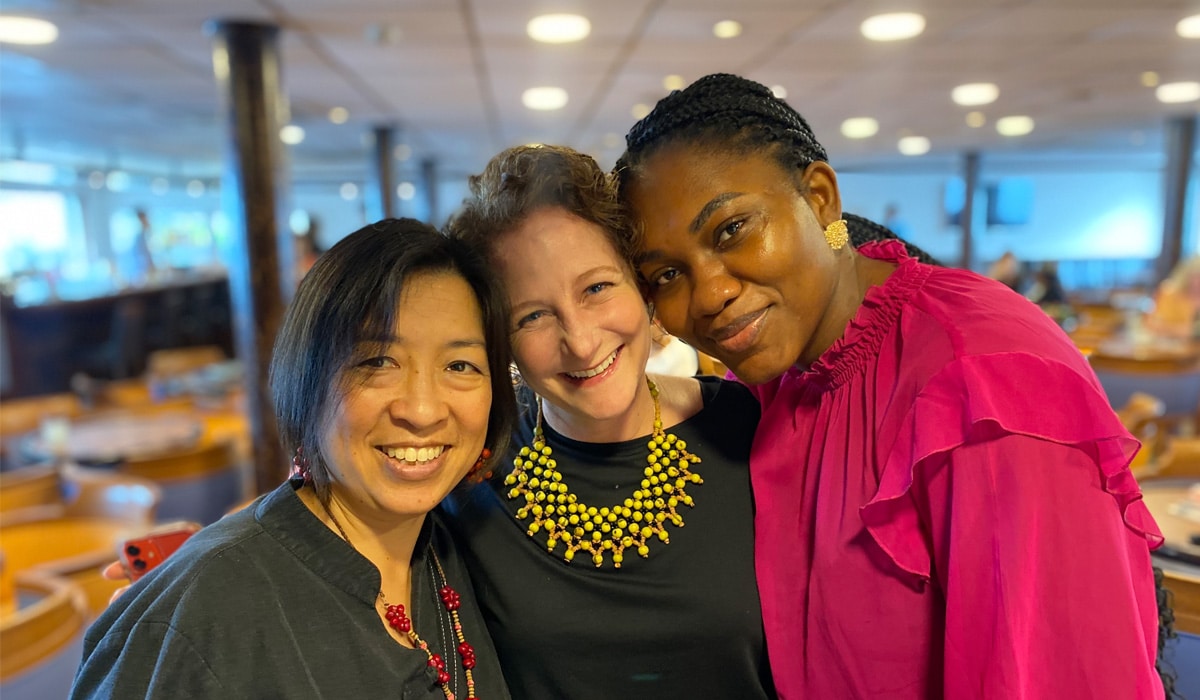Looking back at Patty Fong's inspiring legacy on food, climate and health at the Global Alliance
Today is my last day at the Global Alliance for the Future of Food as I embark on a new journey to lead the food and agriculture program at ClimateWorks Foundation. Writing this blog brings up a bunch of special memories as I look back on the work I led with our wonderful members and partners at the Global Alliance.
Exactly five years ago, I joined the secretariat team from the world of climate philanthropy eager to bridge connections between food, climate and health. Back then, food systems transformation remained deeply siloed from the broader climate mitigation work, which largely focused on accelerating a clean energy transition. But that same year, the International Panel on Climate Change (IPCC) Special Report on Climate Change and Land shifted the discourse by highlighting the need for an all-sector approach, including and especially in land and food, to slash greenhouse gas (GHG) emissions in the next crucial decade to keep global warming to well below 2ºC.

My time at the Global Alliance has taught me so much about grappling with complex interconnections, applying systems thinking, and the importance of the Global Alliance principles to guide our approach to change.
How do we transform the way we produce and consume food to be climate friendly? Why is it not simply about substituting fossil fuel-based inputs for low-carbon inputs, intensifying production, or inventing technologies? Why is focusing just on fossil fuel emissions not useful for a systemic problem at the root of multiple global crises — from biodiversity loss and environmental degradation to undernutrition and obesity, cultural erosion, and human rights violations? How do we transform industrial food systems so that they equitably and simultaneously deliver on climate action, enhance and protect biodiversity and the environment, improve health and nutrition, protect cultural traditions, and promise fair wages for all food producers and workers?
The solutions are never simple or straightforward.
Change starts with questioning our assumptions and the narratives we reproduce about industrial food systems and whether they are fit for purpose. Research, investment, policy priorities, and practices are guided by these mainstream narratives.
Much of our focus and strategy in the last five years has been to challenge assumptions and cast a critical lens on existing narratives on health, climate, and food and to build the evidence for transformational change:
In 2020, a few months into the COVID-19 pandemic, we published a health-focused food system vision and narrative, based on a yearlong stakeholder-led engagement process that gathered insights from a diverse array of individuals and organizations working across the food-health nexus, in varied contexts, scales, cultures, and geographies — including with the World Health Organization (WHO). We understood that transformational change will not occur without shifting narratives and mindsets, an inspirational vision of what is possible, and a recognition that ecological and animal health are integral to human health, well-being, and happiness.
A few months later we published a guide to government action and 13 examples of national governments, food producers, community groups, businesses, researchers, investors, and civil society organizations that are collaborating to build resilience and improve food security. In 2021, the WHO followed up with their own Food Systems Delivering Better Health narrative.
In 2021-2022, we convened experts in Africa, Latin America and Southeast Asia to understand the regional contexts of the food-health nexus. We worked with global and regional health networks to survey health sector workers (doctors, nurses, medical students, dietitians and nutritionists). They ranked the availability and marketing of ultra-processed foods, followed by environmental contamination, pollution and degradation, and climate change as the biggest threats to global health from a broken food system. Based on the results of this survey and the discussions, we published insights from 10 more examples targeting health professionals on how food–health action can be taken at local, regional, national, and international levels.
Alongside efforts to elevate healthy food systems, we brought together stakeholders on food and climate to engage on issues of alignment but to also open up about contentions. For example, we learned from the Salzburg Process on the Climate Emergency and Future of Food that the food and climate communities could not agree on a global shared action framework because actions must be locally determined and led. There was, however, alignment on the need for a paradigm shift:
from: food systems dominated by a focus on yields and calories, reliant on chemical-intensive agriculture, concentrated livestock production, ultra-processed foods, deregulated and consolidated global supply chains that exploit the workforce, and extractive land and water practices that undermine ecosystem health, basic human rights, and cultural traditions
to: food systems that are focused on multiple benefits including health, resilience, diversity, equity, inclusion, renewability, and interconnection; that function as a sink for greenhouse gases while minimizing emissions; that are centred on human rights and sustainable food production practices; that enhance ecosystem health, support community resilience and livelihoods, ensure nutritious, accessible, and culturally respectful diets, build biodiversity, and protect food sovereignty.
But how do we prioritize food in climate action and deepen understanding on a food systems approach? This is what we set out to do with the Untapped Opportunities for Climate Action: An Assessment of Food Systems in Nationally Determined Contributions (NDCs), which we promoted just ahead of COP26 in 2021. We followed up with Untapped Opportunities: Climate Financing for Food Systems Transformation ahead of COP27, which showed that just 3% of climate finance goes towards food systems even though growing, processing and transporting food account for over a third of GHGs. Most recently ahead of COP28, we published Power Shift: Why We Need to Wean Industrial Food Systems Off Fossil Fuels which calculated that at least 15% of fossil fuel emissions are linked to food systems.
Over the last two years we have championed and supported diverse frontline leaders from underrepresented communities at the COPs. As advocates for change, they bring a powerful message from grassroots communities determined to use the opportunity to meet with negotiators and interact with global media. We have strengthened and widened work with allies at global events to ensure food systems are mainstream in the global climate agenda.
However, with increased attention on food in climate, there is also growing pushback from vested interests not least through corporate greenwashing of the food systems agenda and the need to align strategies on agriculture and aquatic foods.
As I transition to ClimateWorks Foundation, with deep gratitude for all the relationships and friendships made at the Global Alliance, it begins a new chapter with my own engagement with the Global Alliance as I seek new ways to broaden opportunities among philanthropies working at the intersection of food, agriculture and climate. I will no doubt continue to rely on our community, collective knowledge and vision as we tackle these most urgent issues of our time.


